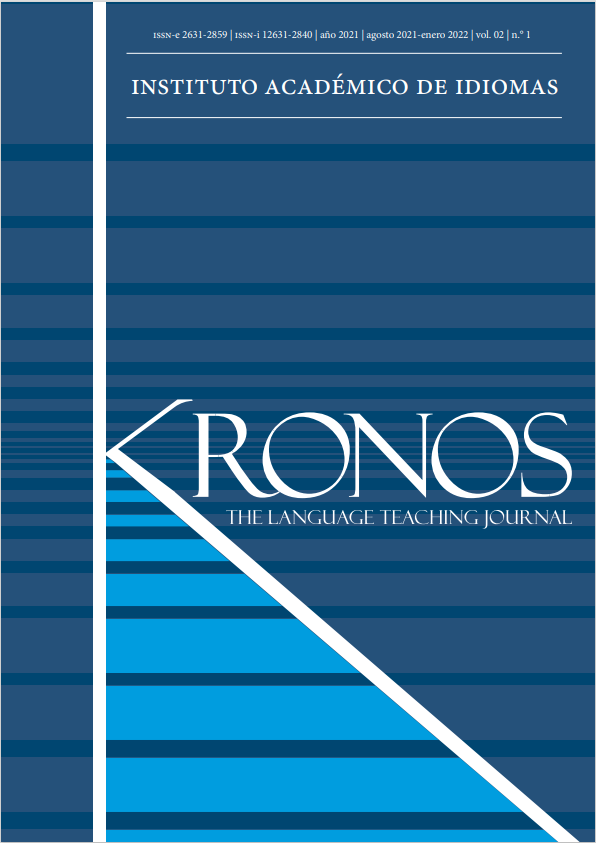Developing english as a foreign language (EFL) teacher’s identity
the role of efl teachers in the classroom
DOI:
https://doi.org/10.29166/kronos.v2i1.3124Keywords:
Experience, EFL teacher, role, emotional labor, identity, negotiationAbstract
Early teaching and student experiences act as cultural references for English as a Foreign Language teachers. Tools and strategies are articulated in the form of roles, which are constantly tested and negotiated within the classroom, modeling the EFL teacher’s identity. The following is a case study on three EFL teacher’s identity development from the Pontificia Universidad Católica del Ecuador. The presence of roles related to EFL teaching was identified through a semi-participant observation and compiled in an observation grid. Observed tools and strategies origin was deepened in the transcription of interviews based on life stories, using a biographical methodology. The use of Socializing / Empathizing skills from the Acculturator role were present in codeswitch using an Ecuadorian pitch, aimed to deal with emotional transactions in the class successfully. Previous working experiences allowed teachers to find strategies to incorporate EFL teaching roles with low emotional labor. Role models from the family and working context played a crucial role in the integration of emotional tools to negotiate roles within the class with low emotional labor.
Downloads
References
Aghaei, P., Bavali, M., & Behjat, F. (2020). An In-depth Qualitative Study of Teachers’ Role Identities: A Case of Iranian EFL Teachers. International Journal of Instruction, 601-620.
Arias, F. G. (2012). El proyecto de investigación. Caracas: EPISTEME.
Barnett, B., & Shields, P. M. (2020). Solving the teacher shortage: Revisiting the lessons we've learned. Phi Delta Kappa International, 8-18.
Bernal, C. A. (2010). Metodología de la investigación. Tercera edición. Bogotá: PEARSON EDUCACION.
Bogdan, R. C., & Biklen, K. S. (2007). Qualitative research for education. Boston: PEARSON.
EF Education First. (2020, 11 19). Ecuador queda en el puesto #81 en el ranking de inglés EF EPI. Retrieved from EF Education First: https://www.ef.com.ec/blog/ language/ecuador-queda-en-el-puesto-81-en-el-ranking-de-ingles-ef-epi/
Farrell, S. T. (2010). Exploring the professional role identities of experienced ESL teachers through reflective practice. ELSEVIER, 54-62.
MINEDUC. (2017). Políticas para contratación de personal docente y administrativo en las instituciones educativas foscomisionales y particulares del sistema educativo nacional. Quito-Ecuador: MINEDUC.
Schutz, P. A., & Mikyoung, L. (2014). Teacher emotion, emotional labor and teacher identity. English as a foreign language teacher education: Current perspectives and challenges., 169-186.
Schutz, P. A., Cross, D. I., Hong, J. Y., & Osbon, J. N. (2007). Teacher identities, beliefs and goals related to emotions in the classroom. Emotion in education, 223-241.
Zhang, Y. (2017). I Speak Chinese but I Am Teaching English: Exploring the Influence of Nonnative Speakership in the Construction of Language Teacher Identity. Theory and Practice in Language Studies, 1236-1242.
Published
How to Cite
Issue
Section
License
Copyright (c) 2021 Raúl Sebastián Ramírez Basantes

This work is licensed under a Creative Commons Attribution-NonCommercial-ShareAlike 4.0 International License.












